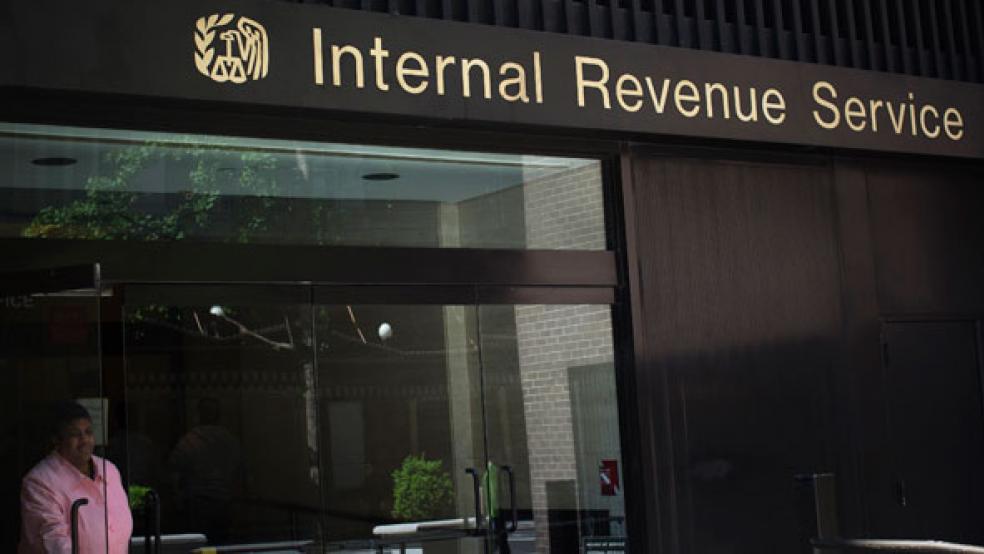It’s hard to imagine Republicans in Congress actively championing legislation that would make it easier for criminals to get away with breaking the law and make it harder for law-abiding citizens to get help from the government all while simultaneously increasing the federal deficit, but that’s exactly what a bill marked up in the House Appropriations Committee on Wednesday would do.
The legislation in question is the spending bill that appropriates money for the Treasury Department, the White House, the federal judiciary and number of other federal agencies. Over the past five years, House Republicans have used the appropriations process to pummel the Internal Revenue Service with cuts that have left the agency funded at a lower level than it operated under in 2008.
Related: IRS Email Suggest Lerner Tried to Target a GOP Senator
Now, nobody loves the IRS. And House Republicans are well within their rights to be angry about the agency’s apparent targeting of conservative groups seeking tax-exempt status. But the nation needs tax revenues to be collected fairly and efficiently in order to function, and both the agency itself and outside observers say that the constant budget cuts have damaged its ability to do its job. Even doing something as seemingly basic as answering taxpayers’ phone calls has become a struggle, according to the Treasury Inspector General for Tax Administration, which cited “long customer wait times” and “customers abandoning calls” in a report issued earlier this year.
“When you have taxpayers that call the IRS and no one’s there to answer the phone, it’s just a clear case of government not being able to perform a core function,” said Chuck Marr, the Director of Federal Tax Policy at the Center on Budget and Policy Priorities.
The more far-reaching damage to the country, though, may come as a result of the revenue that is foregone by crippling the agency’s enforcement division. Every dollar the IRS collects in tax payments is a dollar the Treasury doesn’t have to borrow to meet the country’s spending needs. To be blunt, making it harder for the IRS to do its job is fiscal stupidity distilled to its essence. It’s the equivalent of leaving money on the table, then borrowing the same amount of money and agreeing to pay it back with interest.
Related: IRS Head Defends Destruction of Lois Lerner’s Hard Drive
And the amount of the money sitting on the table is huge. The “tax gap” — that is, the difference between the amount of money the government collects and the amount it is actually owed — is more than $40 billion a year domestically. Add in unpaid taxes from companies and individuals doing business overseas and it balloons to more than $100 billion.
Every $1 spent on the IRS Enforcement Division, which is in charge of making sure that people and corporations pay what they owe in taxes, yields $6 in increased revenue. And, to be clear, that’s not revenue gained by squeezing law-abiding taxpayers for more of their money. It’s getting people breaking the law to pay what they owe. Yet the Enforcement Division has had to cut its staff by 15 percent since 2010. The result has been a decline in audits, a decline in examination, and the loss of billions of dollars in revenue.
The damage isn’t just fiscal, either, notes Marr of CBPP. It’s fundamentally unjust to those who do pay their taxes. “Honest people deserve to have less-than-honest people pay their taxes, too,” he said.
But hammering the taxman is always a winning move, especially in the GOP-led House of Representatives, where Republicans are currently conducting multiple investigations into the IRS’s treatment of conservative political groups.
Related: Lawmakers Want to Dig Up IRS’s ‘Hard Drive Cemetery’
Appropriations Committee Chairman Hal Rogers (R-KY), who has characterized the agency as “scandal plagued and inefficient” trumpeted the further cuts to the agency’s budget during a committee meeting on Wednesday.
Noting that the Obama administration had requested funding for the IRS that would bring its budget roughly in line with the rate of inflation, Rogers said in a statement that under the House bill, “the budget for the IRS has been reduced by $1.5 billion below the president’s request. This funding is sufficient for the agency to perform its core duties, but will require IRS management to make better and more efficient choices.”
Rep. Ander Crenshaw (R-FL), who chairs the subcommittee with jurisdiction over the IRS appropriation, also pointed out that the bill bars the agency from enforcing the Affordable Care Act’s individual mandate, despite the fact that the Supreme Court ruled the mandate a tax that is legal under the Constitution and is therefore within the purview of the IRS.
Rep. Jose Serrano (D-NY), the ranking Democrat on Crenshaw’s subcommittee, was obviously frustrated by the bill’s reduction in the IRS budget, calling it “yet another misguided attempt to punish the agency…and to hamstring it during the implementation [of the] Affordable Care Act. Unfortunately, the real result of this cut will be to simply prevent the agency from collecting money from tax cheats, and to increase our deficit as a result.”
Top Reads from The Fiscal Times
- Senate Alums Know How to Fix Our Broken Government
- McCarthy Rolls Over for Tea Party on Ex-Im Bank
- Feds Find Polarization in DC Drives Inequality



